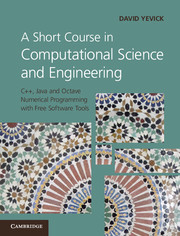 A Short Course in Computational Science and Engineering
A Short Course in Computational Science and Engineering Book contents
- Frontmatter
- Contents
- Chapter 1 Introduction
- Chapter 2 Octave programming
- Chapter 3 Installing and running the Dev-C++ programming environment
- Chapter 4 Introduction to computer and software architecture
- Chapter 5 Fundamental concepts
- Chapter 6 Procedural programming basics
- Chapter 7 An introduction to object-oriented analysis
- Chapter 8 C++ object-oriented programming syntax
- Chapter 9 Arrays and matrices
- Chapter 10 Input and output streams
- Chapter 11 References
- Chapter 12 Pointers and dynamic memory allocation
- Chapter 13 Memory management
- Chapter 14 The static keyword, multiple and virtual inheritance, templates and the STL
- Chapter 15 Creating a Java development environment
- Chapter 16 Basic Java programming constructs
- Chapter 17 Java classes and objects
- Chapter 18 Advanced Java features
- Chapter 19 Introductory numerical analysis
- Chapter 20 Linear algebra
- Chapter 21 Fourier transforms
- Chapter 22 Differential equations
- Chapter 23 Monte Carlo methods
- Chapter 24 Partial differential equations
- Index
Chapter 9 - Arrays and matrices
Published online by Cambridge University Press: 05 June 2012
- Frontmatter
- Contents
- Chapter 1 Introduction
- Chapter 2 Octave programming
- Chapter 3 Installing and running the Dev-C++ programming environment
- Chapter 4 Introduction to computer and software architecture
- Chapter 5 Fundamental concepts
- Chapter 6 Procedural programming basics
- Chapter 7 An introduction to object-oriented analysis
- Chapter 8 C++ object-oriented programming syntax
- Chapter 9 Arrays and matrices
- Chapter 10 Input and output streams
- Chapter 11 References
- Chapter 12 Pointers and dynamic memory allocation
- Chapter 13 Memory management
- Chapter 14 The static keyword, multiple and virtual inheritance, templates and the STL
- Chapter 15 Creating a Java development environment
- Chapter 16 Basic Java programming constructs
- Chapter 17 Java classes and objects
- Chapter 18 Advanced Java features
- Chapter 19 Introductory numerical analysis
- Chapter 20 Linear algebra
- Chapter 21 Fourier transforms
- Chapter 22 Differential equations
- Chapter 23 Monte Carlo methods
- Chapter 24 Partial differential equations
- Index
Summary
In this and the following chapter, arrays, references and pointers are examined. These will prove essential to a more detailed discussion of objects and classes.
Data structures and arrays
An array constitutes a built-in (e.g. native to the compiler) data structure, which denotes a collection of related quantities with common ordering properties. Each object in an array must be of the same type and is accessible through an integer index. Other commonly occurring data structures include the following.
A bag – an unordered collection of objects.
A set – a bag in which no object can appear more than once.
A list – an object sequence that enables navigation between an object and its successor.
An ordered list – a list with the property that an object can be accessed through its position as well as by way of the neighboring object.
A sorted list – a list with elements stored according to a given ordering operation.
A key set– an object collection that employs a key such as a word or number to locate elements.
A stack – a container for which elements can be added or removed only at the first (top) position; that is, only the last element to be added is accessible at any given time.
A queue – a container constructed such that only the oldest (first) element in the container can be removed at any given time.
Information
- Type
- Chapter
- Information
- A Short Course in Computational Science and EngineeringC++, Java and Octave Numerical Programming with Free Software Tools, pp. 83 - 92Publisher: Cambridge University PressPrint publication year: 2012